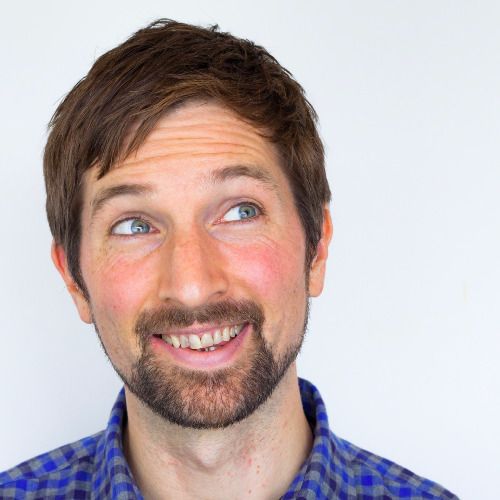Project Conspiracy with Ricky Green
The foxes talk to Ricky Green of the Unversity of Kent about conspiracy theories and what causes people to believe in the unbelievable.
Specifically why are conspiracy theories so prevalant right now, in one of humanity's darkest hours, after a year of near-lockdown for so many? Does stress play a factor in our willingness to believe?
We explore what factors cause people to believe, the types of belief and most importantly, Ricky guides us as to how to handle the next time a friend or family member starts sharing their views on a "conspiracy" with you.
Ricky works alongside one of the leading teams of conspiracy theory research in the UK and shares some really interesting ideas which will cause you to see conspiracy theories and their believers in a whole new light.
About the show
Old Fox Young Fox is an intergenerational conversation between Jeremy Woolwich and Oliver Happy, one that explores the impacts of a rapidly changing world.
- Check out Ollie's new show: Problem Busters
About our guest
Ricky Green is a PhD student at University of Kent and is keenly interested in researching the subject of Conspiracy theories. Once one "to believe" in such theories himself, he now devotes his time to studying the factors that can influence our likelihood to believing in Conspiracy theories. Ricky lives on the South Coast in England.
Show mentions:
- 9-11 and if it is a conspiracy
- Zeitgeist the movie
- Is covid-19 a conspiracy and is Bill Gates looking to get a monopoly on vaccines?
- Was Covid-19 a lab experiment that escaped?
- 09:00 What is the difference between a conspiracy and a conspiracy theory?
- Is the New World Order a conspiracy theory?
- The word conspiracy and the power it holds to the listener
- Why do we suspend belief when it comes to conspiracy theories?
- 12:00 There is so much evidence against so many conspiracy theories, overwhelming in many cases
- Vaccinations as a hot topic in the conspiracy theorist's world and Anti-vaccination sentiment
- The spectrum of fantasists through to the rational sceptics
- At what point do people move from being rational to believing outlandish things?
- 14:30 The spectrum of thinking from rational thought through to believing the queen of england is a reptilian lizard
- 15:30 Measuring believe in conspiracy theories and the strongest determinist factor being believing in another
- 16:30 The main qualitative study where conspiracy believers were interviewed and themes drawn out into 5 types of conspiracy believers <-----
- Unusual ontology (way of thinking) to describe levels of belief in conspiracies
- 18:30 Attachment theory as a determinant of belief in conspiracies <-----
- People with a secure attachment style being less likely to believe in conspiracies, compared to people with an insecure attachment style who are far more likely to believe.
- 20:30 The link between anxiety and a tendency to catastrophise as a determinant in belief in conspiracy theories
- 22:30 A recent development in research via Professor Karen Douglas from the University of Kent and her team, concluding that conspiracy theories appeal to people whose important psychological needs are not being met.
- Our thinking style as a determinant of how interesting conspiracy theories are.
- 24:30 Animation as a tool of research, to measure the level of consciousness in shapes and therefore agency and intentionality in shapes.
- Humans as pattern seeking animals
- Those who see patterns where they do not exist are also believers in conspiracy theories
- 26:00 Level of education as a factor in likelihood to believe in conspiracy theories
- Covid-19 and a lack of feeling secure as fuel to the rise in conspiracy theories
- The role of level of information and quality of information in the level of conspiracy theory belief within society
- The speed of change and facts changing in a time of uncertainty creating a space for conspiracy theories to grow
- Person: Olivier Klein as a conspiracy theory researcher on Twitter
- 33:00 how to find a middle ground to help debating with conspiracy theorists
- The conspiracy theory regarding the protocols of the elders of Zion was discredited in the 1920s and yet keeps re-emerging
- 35:00 Why conspiracy theories are so persistent, even in the face of facts to the contrary in many cases
- Anti-sematism as a vehicle to many conspiracy theories and the link between banking and financial power and being scapegoated by such theories
- 39:00 conspiracy denialists and why some people outright deny all conspiracies
- Dixon of Dock Green and trust in the Police https://en.wikipedia.org/wiki/Dixon_of_Dock_Green
- Is trust in institutions a generational thing
- GCHQ and the decline in privacy, mistrust of big tobacco as fuel in a rise of distrust
- 44:30 Age has a reverse relationship in level of belief in conspiracy theories - where younger people are more likely to believe than their elders
- The need for longitudinal research, studies over long periods of time, to see how people's views change over the course of their lives
- 48:30 people being drawn to conspiracy theories as a way to make sense of the world
- People who are high in levels of intuition are more likely to believe in conspiracy theories
- False flag operations and the gulf of Tomkin as a way to enter the Vietnam war - as events that raise distrust in the public
- The tendency to label legitimate debates as conspiracy theories in order to discredit them and in many cases, delay action
- David Icke is vilified but is an interesting conspiracy entrepreneur
- 01:03:00 The kernel of truth in all conspiracies and identifying it as a means to learning more about a topic, without getting caught in the theory
- Conducting a steel man test on conspiracies to try and unravel them and a shortage of time leading to delegation of rigorous debate
- Episode: Citizens assemblies
- Youtube taking down a 2hr special 5G conspiracy theory video made by David Icke and this inciting emotion and violence
- The destructive role of populists and those who propagate conspiracy theories
- The Pfizer vaccine for covid-19 and politicians grandstanding its arrival
- Nietre: I'm not angry at you because you lied to me, I'm angry at you because I can't trust you any more
- A potential inverse relationship between level of general wellness in a country and the number of conspiracy theorists
- QAnon as an example of a major American conspiracy that is based on facts so difficult to believe, and yet two senators have been elected publicly stating they believe in the concept.
- Book: Suspicious minds by Rob Brotherton - https://www.amazon.co.uk/Suspicious-Minds-Believe-Conspiracy-Theories/dp/1472915615
- 01:17:00 boosting well being as a way to help people deal with a tendency to believe in conspiracy theories <-------
- Article: boosting well being as a way to counter conspiracy beliefs - https://www.nature.com/articles/d41586-020-03130-6
This podcast uses the following third-party services for analysis:
Podtrac - https://analytics.podtrac.com/privacy-policy-gdrp



